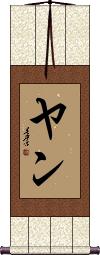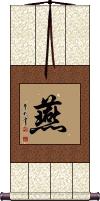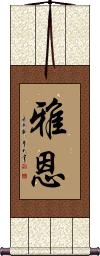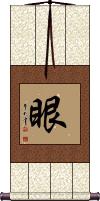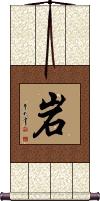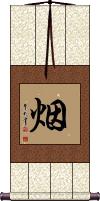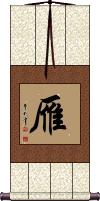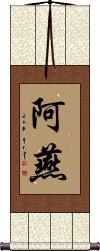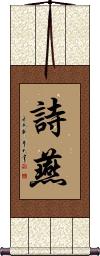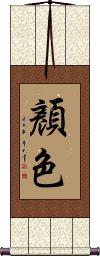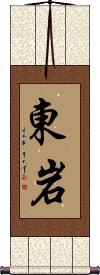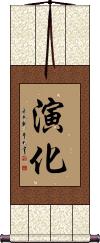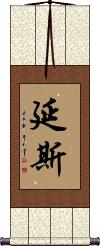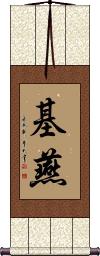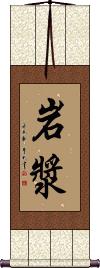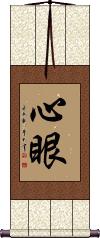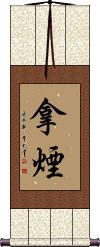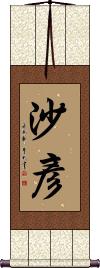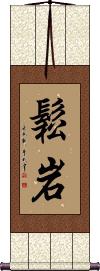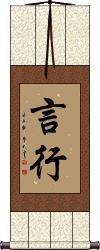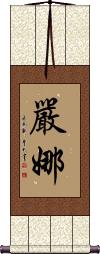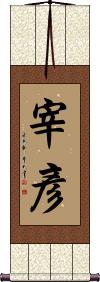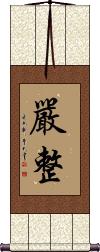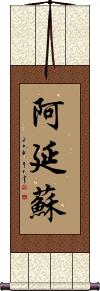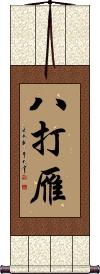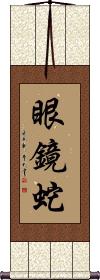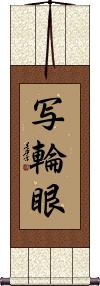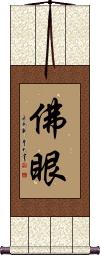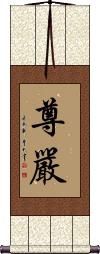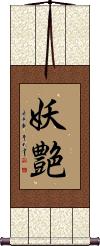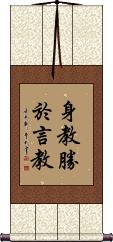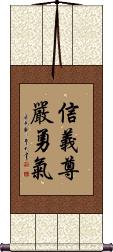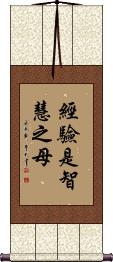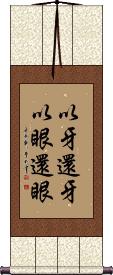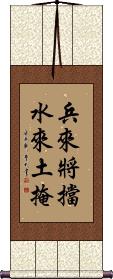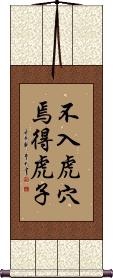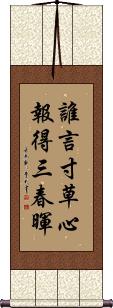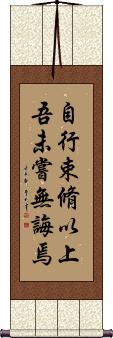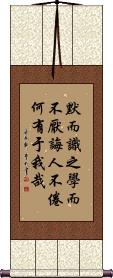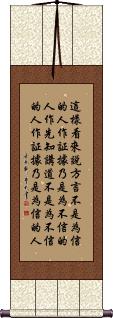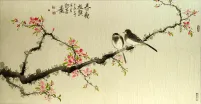Many custom options...
And formats...

Yan in Chinese / Japanese...
Buy a Yan calligraphy wall scroll here!
Personalize your custom “Yan” project by clicking the button next to your favorite “Yan” title below...
1. Yan
2. Swallow
3. Jan
6. Iwa
7. Smoke
8. Wild Goose
9. Ayan
10. Cheyenne
11. Color
12. Dongam
14. Jens
15. Keyan
16. Kiyane
17. Lava / Magma
18. Mind’s Eye
19. Nayan
20. Nayen
21. Shayan
22. Songam
23. Words and Deeds
24. Yona
25. Zaiyan
26. Well-Disciplined / Orderly
27. Ayansu
28. Ayende
29. Batangas
30. Clairvoyance
31. Cobra
32. Sharingan
33. Stefanie
35. Dignity / Honor / Sanctity / Integrity
39. Eye for an eye
40. Words Have Enormous Weight: One Word Worth Nine Caldrons
41. Honor Courage
42. Irigoyen
43. Romance of the Three Kingdoms
45. One swallow doesn’t make a summer
46. Example is Better than Precept
48. You are always a beauty in your lover’s eyes
49. Experience is the Mother of Wisdom
50. Eye for an eye, tooth for a tooth
51. Soldiers Adapt Actions to the Situation
52. How can you catch tiger cubs without entering the lair of the tiger?
54. Appreciation and Love for Your Parents
55. Confucius: Universal Education
Swallow
燕 is the single character for the swallow (bird).
If you are a zoologist, this can refer to birds of the family Hirundinidae. Sometimes used to refer to Hirundo rustica (the barn swallow).
燕 is also a surname in China that is romanized as Yan. In fact, there were also several different Yan kingdoms in the ancient history of China (which is the origin of the surname).
Broken Mirror Rejoined
Used in modern times for divorced couples that come back together
破鏡重圓 is about a husband and wife who were separated and reunited.
About 1500 years ago in China, there lived a beautiful princess named Le Chang. She and her husband Xu De Yan loved each other very much. But when the army of the Sui Dynasty was about to attack their kingdom, disposed of all of their worldly possessions and prepared to flee into exile.
They knew that in the chaos, they might lose track of each other, so the one possession they kept was a bronze mirror which is a symbol of unity for a husband and wife. They broke the mirror into two pieces, and each of them kept half of the mirror. They decided that if separated, they would try to meet at the fair during the 15th day of the first lunar month (which is the lantern festival). Unfortunately, the occupation was brutal, and the princess was forced to become the mistress of the new commissioner of the territory, Yang Su.
At the Lantern Festival the next year, the husband came to the fair to search for his wife. He carried with him his half of the mirror. As he walked through the fair, he saw the other half of the mirror for sale at a junk market by a servant of the commissioner. The husband recognized his wife's half of the mirror immediately, and tears rolled down his face as he was told by the servant about the bitter and loveless life that the princess had endured.
As his tears dripped onto the mirror, the husband scratched a poem into his wife's half of the mirror:
You left me with the severed mirror,
The mirror has returned, but absent are you,
As I gaze in the mirror, I seek your face,
I see the moon, but as for you, I see not a trace.
The servant brought the inscribed half of the mirror back to the princess. For many days, the princess could not stop crying when she found that her husband was alive and still loved her.
Commissioner Yang Su, becoming aware of this saga, realized that he could never obtain the princess's love. He sent for the husband and allowed them to reunite.
This proverb, 破鏡重圓, is now used to describe a couple who has been torn apart for some reason (usually divorce) but have come back together (or remarried).
It seems to be more common these days in America for divorced couples to reconcile and get married to each other again. This will be a great gift if you know someone who is about to remarry their ex.
Eyeballs / Eyes
眼 is the simplest way to write eyes or eyeballs in Chinese, Japanese Kanji, and old Korean Hanja.
This can also mean eyesight, sight, vision, look, stare, glance, viewpoint, insight, perceptivity, the power of observation, or simply the eye.
岩 is a Chinese, Japanese, and old Korean word that means cliff, rock, boulder, or anchor.
This Kanji can also be Japanese surnames that romanize as Iwayanagi, Iwahama, Iwazagi, Iwazaki, Iwasaki, Iwagazaki, Iwao, Iwa, or Iiwasaki.
Smoke
烟 is the coolest Chinese, Japanese Kanji, and old Korean Hanja title for smoke.
This can also mean fumes and/or refer to tobacco and opium.
In Japanese, this can be the given name Engan.
Wild Goose
Ayan
Cheyenne
Color
顏色 is kind of a weird selection for a wall scroll, but we added it to our database at the request of a customer.
顏色 means “color” in Chinese. However, in Japanese, it would mean complexion, countenance, or expression. The last character is used alone in Japanese (and sometimes in Chinese with/as an adjective/modifier) to mean “color.”
Dongam
Evolve / Evolution
Jens
Keyan
Kiyane
Lava / Magma
Mind’s Eye
Nayan
Nayen
Shayan
Songam
Words and Deeds
言行 means words and actions, what one says and what one does, speech and behavior, or words and deeds in Chinese, Japanese Kanji, and old Korean Hanja.
Yona
Zaiyan
Well-Disciplined / Orderly
Special Military Term
When reading an account of some battles in China, I came across the Chinese word, 嚴整. As it turns out, 嚴整 is only used in military circles to describe neat, orderly, and well-disciplined troops. Perhaps this is actually closer to the meaning I was taught while in the U.S. Marines.
The first character literally means stern, serious, strict, or severe (it can also mean airtight or watertight.
The second character means exact, in good order, whole, complete, and orderly.
Together, these two characters multiply each other into a word that expresses the highest military level of discipline.
See Also: Self-Control | Will-Power
Ayansu
Ayende
Batangas
Clairvoyance
Cobra
Stefanie
The Eye of the Buddha
Dignity / Honor / Sanctity / Integrity
尊嚴 is a form of honor that means showing great respect for yourself, other people, and the rules you live by.
When you are honorable, you keep your word. You do the right thing regardless of what others are doing.
尊嚴 is the kind of personal honor or dignity that is of great value. If you lose this, you have lost yourself and perhaps the reputation of your family as well.
While this is not directly the same thing as “face” or “saving face” in Asian culture, it is associated with the same concept in China.
![]() In Japan, they currently use a more simplified second character for this word. The ancient Japanese form is the same as China but after WWII some Kanji were changed. If you want the modern Japanese version, just click on the Kanji image shown to the right, instead of the button above.
In Japan, they currently use a more simplified second character for this word. The ancient Japanese form is the same as China but after WWII some Kanji were changed. If you want the modern Japanese version, just click on the Kanji image shown to the right, instead of the button above.
Sexy / Voluptuous
妖艶 means sexy, fascinating, voluptuous, or bewitching in Japanese Kanji. 妖艶 / 妖艷 is specifically in regards to women.
This has a dictionary meaning of flirtatious or bewitchingly pretty in Chinese. However, in practice, this would refer to a sexy but bitchy woman in modern China.
This is also a word in old Korean Hanja; however, I have not confirmed how it is perceived in Korean culture.
This may not be appropriate for a wall scroll unless your audience is Japanese only.
![]() Note: The second character can also be written in the alternate version shown to the right.
Note: The second character can also be written in the alternate version shown to the right.
Beautiful Woman Proverb
沈魚落雁 is an old proverb that literally means “fish sink, goose alights.”
...But this takes some explaining. This is a proverb from Zhuangzi (莊子), who lived in the late 4th century BC.
This figuratively refers to female beauty that is so captivating that even the birds and beasts take notice.
Perhaps a better and more accurate way to describe this is to say that it speaks of the charms of a uniquely beautiful woman who is so beautiful that fish stay on the bottom of the water and flying wild geese fall from the sky in shame.
This proverb is so famous that it is also known and used in Japan (same characters, different pronunciation).
Note: This can also be written 沉魚落雁 instead of 沈魚落雁 (just the first character varies slightly).
Brief and to the Point
Speak simply, while expressing your idea completely
言簡意賅 is a Chinese proverb that suggests it is better to be brief and use fewer words while still expressing your main point or idea.
In another way to explain this, one should not use 100 words when 50 will do, or being more concise with your speech.
This can also be translated as concise, compendious, “brief in form but comprehensive in scope” or succinct.
This is a bit more positive than our other proverb for brevity.
Eye for an eye
Words Have Enormous Weight: One Word Worth Nine Caldrons
一言九鼎 is an ancient Chinese proverb used in modern times to talk of profound or powerful words.
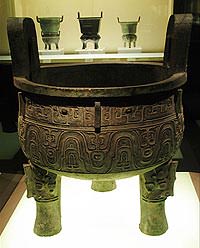 The literal meaning is “one word [worth] nine [sacred] tripods.” The tripod is a highly-prized three-legged (sometimes four-legged) metal pot or kettle of ancient China. They are often made of bronze, and the Emperor would have large ones gilded in gold. See the image to the right for an example.
The literal meaning is “one word [worth] nine [sacred] tripods.” The tripod is a highly-prized three-legged (sometimes four-legged) metal pot or kettle of ancient China. They are often made of bronze, and the Emperor would have large ones gilded in gold. See the image to the right for an example.
Honor Courage
尊嚴勇氣 is a word list that means “Honor [and] Courage.”
Word lists are not common in Chinese, but we've put this one in the best order/context to make it as natural as possible.
We used the “honor” that leans toward the definition of dignity and integrity since that seemed like the best match for courage.
Irigoyen
Romance of the Three Kingdoms
Novel Title
Songahm Taekwondo
松巖跆拳道 is the title Songahm Taekwondo.
If you want this written in Korean Hangul instead of Hanja, click on the Hangul characters below the Korean flag above.
Note, Songahm is usually written in Hanja as 松巖. However, in Traditional Chinese, it would be 鬆巖, and in modern Japanese, it can be 松岩 (but not known in this context - I think it's a small train station and place in Japan).
Technically, all of these can also be Korean Hanja so that you might see these variations in use. If you need a version other than 松巖, just let me know when you order.
One swallow doesn’t make a summer
Example is Better than Precept
Tell somebody how to do something and they might get it.
Show them how to do it, and they will master it in no time.
身教勝於言教 can also be translated as “Behavior teaches more than words.”
See Also: Wisdom
Fidelity Honor Courage
信義尊嚴勇氣 means fidelity, honor, and courage in Chinese.
This is a word list that was requested by a customer. Word lists are not common in Chinese, but we've put this one in the best order/context to make it as natural as possible.
We used the “honor” that leans toward the definition of “dignity” since that seemed the best match for the other two words.
Please note: These are three two-character words. You should choose the single-column format when you get to the options when you order this selection. The two-column option would split one word or be arranged with four characters on one side and two on the other.
You are always a beauty in your lover’s eyes
Any woman with affection for Asian art will love a gift of this Chinese proverb calligraphy on a wall scroll.
She will melt in your arms as you tell her the meaning of these characters.
Contained in this phrase is a reference to the most beautiful woman in Chinese history. Her name was Xi Shi, and she was known to have good looks that need not have fine robes or makeup. Her charms were so powerful that she brought down an entire kingdom (in a successful effort to bring honor and pride back to her people).
情人眼里出西施 is a great way to express that the woman in your life is your one love.
Experience is the Mother of Wisdom
It's been said that wisdom comes from good judgment, and good judgment comes from experience, while experience comes from a series of times when you used bad judgment.
經驗是智慧之母 is a Chinese proverb that makes the simplest connection between experience and wisdom.
See Also: Failure is the Mother of Success | Wisdom | Learn From Wisdom
Eye for an eye, tooth for a tooth
Here's the full proverb, 以牙还牙以眼还眼, with the first and second parts.
However, in Chinese, it's more natural to put the “tooth” part first, so this more accurately reads “Tooth for a tooth, eye for an eye.”
If revenge is important to you, I suppose this is the phase you want on your wall.
Soldiers Adapt Actions to the Situation
This Chinese military proverb means, counter soldiers with arms and counter water with an earthen dam.
兵來將擋水來土掩 is about how different situations call for different actions. You must adopt measures appropriate to the actual situation.
To explain the actual proverb, one would not attack a flood of water with gunfire, nor would you counter-attack soldiers by building an earth weir. You must be adaptable and counter whatever threatens with relevant action.
How can you catch tiger cubs without entering the lair of the tiger?
Nothing ventured, nothing gained
While perhaps no longer politically correct, this Chinese proverb is a reminder that you must take risks if you want rewards.
不入虎穴焉得虎子 is similar to the English proverb, “Nothing ventured, nothing gained.”
The literal word order of the Chinese is, “If (you) don't enter the tiger's lair/cave, how can (you) get/obtain tiger cubs?.”
In Wine there is Truth
酒后吐真言 / 酒後吐真言 is a nice Asian proverb if you know a vintner or wine seller - or wine lover - although the actual meaning might not be exactly what you think or hope.
The literal meaning is that someone drinking wine is more likely to let the truth slip out. It can also be translated as “People speak their true feelings after drinking alcohol.”
It's long believed in many parts of Asia that one can not consciously hold up a facade of lies when getting drunk, and therefore the truth will come out with a few drinks.
I've had the experience where a Korean man would not trust me until I got drunk with him (I was trying to gain access to the black market in North Korea which is tough to do as an untrusted outsider) - so I think this idea is still well-practiced in many Asian countries.
Please note that there are two common ways to write the second character of this phrase. The way it's written will be left up to the mood of the calligrapher, unless you let us know that you have a certain preference.
Appreciation and Love for Your Parents
誰言寸草心報得三春暉 is the last line of a famous poem. It is perceived as a tribute or ode to your parents or mother from a child or children that have left home.
The poem was written by Meng Jiao during the Tang Dynasty (about 1200 years ago). The Chinese title is “You Zi Yin” which means “The Traveler's Recite.”
The last line as shown here speaks of the generous and warm spring sunlight which gives the grass far beyond what the little grass can could ever give back (except perhaps by showing its lovely green leaves and flourishing). The metaphor is that the sun is your mother or parents, and you are the grass. Your parents raise you and give you all the love and care you need to prepare you for the world. A debt that you can never repay, nor is repayment expected.
The first part of the poem (not written in the characters to the left) suggests that the thread in a loving mother's hands is the shirt of her traveling offspring. Vigorously sewing while wishing them to come back sooner than they left.
...This part is really hard to translate into English that makes any sense but maybe you get the idea. We are talking about a poem that is so old that many Chinese people would have trouble reading it (as if it was the King James Version of Chinese).
Confucius: Universal Education
自行束脩以上吾未尝无诲焉 means, for anyone who brings even the smallest token of appreciation, I have yet to refuse instruction.
Another way to put it is: If a student (or potential student) shows just an ounce of interest, desire, or appreciation for the opportunity to learn, a teacher should offer a pound of knowledge.
This quote is from the Analects of Confucius.
This was written over 2500 years ago. The composition is in ancient Chinese grammar and phrasing. A modern Chinese person would need a background in Chinese literature to understand this without the aid of a reference.
The Ease of the Scholar
Quote from Confucius
默而识之学而不厌诲人不倦何有于我哉 is a quote from the Analects of Confucius that translates as:
To quietly recite and memorize the classics,
to love learning without tiring of it,
never be bored with teaching,
How could these be difficult for me?
This is a suggestion that for a true scholar, all of these things come with ease.
This was written over 2500 years ago. The composition is in ancient Chinese grammar and phrasing. A modern Chinese person would need a background in Chinese literature to understand this without the aid of a reference.
Tom Clan Generational Poem
爾昌友延嗣捷開文裔光宗傳世澤遠晉本立道隆積善家國重學業廣成芳 is the Tom Clan Generational Poem.
If you are interested in this poem, you probably already know the meaning, so for now we'll forgo including a translation.
1 Corinthians 14:22
Here is 1 Corinthians 14:22 in Chinese.
The text with punctuation:
这样看来,说方言,不是为信的人作证据,乃是为不信的人。作先知讲道,不是为不信的人作证据,乃是为信的人。
Hand-painted calligraphy does not retain punctuation.
This translation is from the Chinese Union Bible.
You may know it from the KJV as:
Wherefore tongues are for a sign, not to them that believe, but to them that believe not: but prophesying serveth not for them that believe not, but for them which believe.
Return to Dwell in Gardens and Fields Poem
This is Tao Yuanming's poem, “Returning to Dwell in Gardens and Fields.”
少無適俗韻 性本愛丘山。
誤落塵網中 一去三十年。
羈鳥戀舊林 池魚思故淵。
開荒南野際 抱拙歸園田。
方宅十餘畝 草屋八九間。
榆柳蔭後簷 桃李羅堂前。
暖暖遠人村 依依墟裡煙。
狗吠深巷中 雞鳴桑樹顛。
戶庭無塵雜 虛室有餘閒。
久在樊籠裡 復得返自然。
This in-stock artwork might be what you are looking for, and ships right away...
Gallery Price: $322.00
Your Price: $178.88
Not the results for yan that you were looking for?
Below are some entries from our dictionary that may match your yan search...
| Characters If shown, 2nd row is Simp. Chinese |
Pronunciation Romanization |
Simple Dictionary Definition |
岩 see styles |
yán yan2 yen yan やん |
More info & calligraphy: Iwa(1) rock; boulder; (2) crag; cliff; (3) anchor; (personal name) Yan |
烟 see styles |
yān yan1 yen engan えんがん |
More info & calligraphy: SmokeSmoke; also tobacco, opium. |
燕 see styles |
yàn yan4 yen tsubame(p); tsubakurame(ok); tsubakura(ok); tsubakuro(ok); tsubame(p) つばめ(P); つばくらめ(ok); つばくら(ok); つばくろ(ok); ツバメ(P) |
More info & calligraphy: Swallow(1) (kana only) swallow (bird of the Hirundinidae family); martin; (2) barn swallow (Hirundo rustica); (3) (See 若い燕) younger man involved with an older woman; boy toy; (given name) Yasushi |
眼 see styles |
yǎn yan3 yen manako まなこ |
More info & calligraphy: Eyeballs / Eyes(1) eye; eyeball; (2) (archaism) pupil and (dark) iris of the eye; (3) (archaism) insight; perceptivity; power of observation; (4) (archaism) look; field of vision; (5) (archaism) core; center; centre; essence; (surname) Mesaki cakṣuh, the eye. |
雁 see styles |
yàn yan4 yen gan がん |
More info & calligraphy: Wild Goose(1) (surname) (given) Gan; (2) (work) The Wild Geese (1913 novel by Mori Ōgai); (surname, given name) Gan; (wk) The Wild Geese (1913 novel by Mori Ōgai) A hawk, also used for hamsa, a wild goose. |
佛眼 see styles |
fó yǎn fo2 yan3 fo yen butsugen |
More info & calligraphy: The Eye of the Buddha |
嚴整 严整 see styles |
yán zhěng yan2 zheng3 yen cheng gonsei |
More info & calligraphy: Well-Disciplined / Orderlyto make neat and tidy |
尊嚴 尊严 see styles |
zūn yán zun1 yan2 tsun yen |
More info & calligraphy: Dignity / Honor / Sanctity / Integrity |
岩漿 岩浆 see styles |
yán jiāng yan2 jiang1 yen chiang ganshou / gansho がんしょう |
More info & calligraphy: Lava / Magma(See マグマ) magma |
心眼 see styles |
xīn yǎn xin1 yan3 hsin yen shingan しんがん |
More info & calligraphy: Mind’s Eyethe mind's eye The eye of the mind, mental vision. |
演化 see styles |
yǎn huà yan3 hua4 yen hua |
More info & calligraphy: Evolve / Evolution |
言行 see styles |
yán xíng yan2 xing2 yen hsing genkou / genko げんこう |
More info & calligraphy: Words and Deedsspeech and behaviour (behavior) Words and deeds. |
顏色 颜色 see styles |
yán sè yan2 se4 yen se |
More info & calligraphy: Color |
千里眼 see styles |
qiān lǐ yǎn qian1 li3 yan3 ch`ien li yen chien li yen senrigan せんりがん |
More info & calligraphy: Clairvoyance(1) clairvoyance; second sight; (2) clairvoyant clairvoyance |
孫燕姿 孙燕姿 see styles |
sūn yàn zī sun1 yan4 zi1 sun yen tzu |
More info & calligraphy: Stefanie |
眼鏡蛇 眼镜蛇 see styles |
yǎn jìng shé yan3 jing4 she2 yen ching she meganehebi めがねへび |
More info & calligraphy: Cobraspectacled cobra; Indian cobra; Asian cobra (Naja naja) |
乵 see styles |
yǎn yan3 yen |
archaic variant of 進|进[jin4] |
偃 see styles |
yǎn yan3 yen |
to lie supine; to stop; to fall down |
傿 see styles |
yàn yan4 yen |
fraudulent price |
儼 俨 see styles |
yǎn yan3 yen gen げん |
majestic; dignified (adj-t,adv-to) strict; stern |
兗 兖 see styles |
yǎn yan3 yen |
used in 兗州|兖州[Yan3 zhou1] (the name of a place in Shandong) |
剡 see styles |
yǎn yan3 yen en |
sharp Pointed, sharp. |
匽 see styles |
yǎn yan3 yen |
to hide, to secrete, to repress; to bend |
厭 厌 see styles |
yàn yan4 yen on いや |
(bound form) to loathe; to be fed up with; (literary) to satiate; to satisfy (noun or adjectival noun) disagreeable; detestable; unpleasant; reluctant Satiated; weary of; disgusted with. |
厳 see styles |
yán yan2 yen tsuyoshi つよし |
Japanese variant of 嚴|严 (adj-t,adv-to) strict; stern; (male given name) Tsuyoshi |
厴 厣 see styles |
yǎn yan3 yen heta へた |
operculum (Latin: little lid); a covering flap (in various branches of anatomy) (kana only) {zool} operculum (of a shellfish) |
唁 see styles |
yàn yan4 yen |
to extend condolences |
啱 see styles |
yān yan1 yen |
correct; suitable; to suit sb; just now (Cantonese) |
喭 see styles |
yàn yan4 yen |
condole with |
噞 see styles |
yǎn yan3 yen |
the movement of a fish's mouth at the surface of the water |
Click here for more yan results from our dictionary
The following table may be helpful for those studying Chinese or Japanese...
| Title | Characters | Romaji (Romanized Japanese) | Various forms of Romanized Chinese | |
| Yan | ヤン | yan | ||
| Swallow | 燕 | yasushi | yàn / yan4 / yan | yen |
| Jan | 雅恩 | yǎ ēn / ya3 en1 / ya en / yaen | ||
| Broken Mirror Rejoined | 破鏡重圓 破镜重圆 | pò jìng chóng yuán po4 jing4 chong2 yuan2 po jing chong yuan pojingchongyuan | p`o ching ch`ung yüan pochingchungyüan po ching chung yüan |
|
| Eyeballs Eyes | 眼 | gan | yǎn / yan3 / yan | yen |
| Iwa | 岩 | iwa | yán / yan2 / yan | yen |
| Smoke | 烟 | kemuri / kemu | yān / yan1 / yan | yen |
| Wild Goose | 雁 | karigane / kari | yàn / yan4 / yan | yen |
| Ayan | 阿燕 | ā yàn / a1 yan4 / a yan / ayan | a yen / ayen | |
| Cheyenne | 詩燕 诗燕 | shī yàn / shi1 yan4 / shi yan / shiyan | shih yen / shihyen | |
| Color | 顏色 颜色 | kao iro / gan shoku kaoiro / ganshoku | yán sè / yan2 se4 / yan se / yanse | yen se / yense |
| Dongam | 東岩 东岩 | dōng yán / dong1 yan2 / dong yan / dongyan | tung yen / tungyen | |
| Evolve Evolution | 演化 | yǎn huà / yan3 hua4 / yan hua / yanhua | yen hua / yenhua | |
| Jens | 延斯 | yán sī / yan2 si1 / yan si / yansi | yen ssu / yenssu | |
| Keyan | 柯岩 | kē yán / ke1 yan2 / ke yan / keyan | k`o yen / koyen / ko yen | |
| Kiyane | 基燕 | jī yàn / ji1 yan4 / ji yan / jiyan | chi yen / chiyen | |
| Lava Magma | 岩漿 岩浆 | ganshou / gansho | yán jiāng yan2 jiang1 yan jiang yanjiang | yen chiang yenchiang |
| Mind’s Eye | 心眼 | shingan | xīn yǎn / xin1 yan3 / xin yan / xinyan | hsin yen / hsinyen |
| Nayan | 拿煙 拿烟 | ná yān / na2 yan1 / na yan / nayan | na yen / nayen | |
| Nayen | 納延 纳延 | nà yán / na4 yan2 / na yan / nayan | na yen / nayen | |
| Shayan | 沙彥 沙彦 | shā yàn / sha1 yan4 / sha yan / shayan | sha yen / shayen | |
| Songam | 鬆岩 松岩 | sōng yán / song1 yan2 / song yan / songyan | sung yen / sungyen | |
| Words and Deeds | 言行 | genkou / genko | yán xíng / yan2 xing2 / yan xing / yanxing | yen hsing / yenhsing |
| Yona | 嚴娜 严娜 | yán nà / yan2 na4 / yan na / yanna | yen na / yenna | |
| Zaiyan | 宰彥 宰彦 | zǎi yàn / zai3 yan4 / zai yan / zaiyan | tsai yen / tsaiyen | |
| Well-Disciplined Orderly | 嚴整 严整 | yán zhěng yan2 zheng3 yan zheng yanzheng | yen cheng yencheng |
|
| Ayansu | 阿延蘇 阿延苏 | ā yán sū a1 yan2 su1 a yan su ayansu | a yen su ayensu |
|
| Ayende | 艾延德 | ài yán dé ai4 yan2 de2 ai yan de aiyande | ai yen te aiyente |
|
| Batangas | 八打雁 | bā dǎ yàn ba1 da3 yan4 ba da yan badayan | pa ta yen patayen |
|
| Clairvoyance | 千里眼 | sen ri gan / senrigan | qiān lǐ yǎn qian1 li3 yan3 qian li yan qianliyan | ch`ien li yen chienliyen chien li yen |
| Cobra | 眼鏡蛇 眼镜蛇 | me gane hebi meganehebi | yǎn jìng shé yan3 jing4 she2 yan jing she yanjingshe | yen ching she yenchingshe |
| Sharingan | 写輪眼 写轮眼 | sha rin gan sharingan | ||
| Stefanie | 孫燕姿 孙燕姿 | sūn yàn zī sun1 yan4 zi1 sun yan zi sunyanzi | sun yen tzu sunyentzu |
|
| The Eye of the Buddha | 佛眼 佛眼 / 仏眼 | butsugen / butsugen | wǔ yǎn / wu3 yan3 / wu yan / wuyan | wu yen / wuyen |
| Dignity Honor Sanctity Integrity | 尊嚴 尊严 / 尊厳 | son gen / songen | zūn yán / zun1 yan2 / zun yan / zunyan | tsun yen / tsunyen |
| Sexy Voluptuous | 妖艶 / 妖艷 妖艳 | you en / youen / yo en | yāo yàn / yao1 yan4 / yao yan / yaoyan | yao yen / yaoyen |
| Beautiful Woman Proverb | 沈魚落雁 沈鱼落雁 | chin gyo raku gan chingyorakugan | chén yú luò yàn chen2 yu2 luo4 yan4 chen yu luo yan chenyuluoyan | ch`en yü lo yen chenyüloyen chen yü lo yen |
| Brief and to the Point | 言簡意賅 言简意赅 | yán jiǎn yì gāi yan2 jian3 yi4 gai1 yan jian yi gai yanjianyigai | yen chien i kai yenchienikai |
|
| Eye for an eye | 以眼還眼 以眼还眼 | yǐ yǎn huán yǎn yi3 yan3 huan2 yan3 yi yan huan yan yiyanhuanyan | i yen huan yen iyenhuanyen |
|
| Words Have Enormous Weight: One Word Worth Nine Caldrons | 一言九鼎 | yī yán jiǔ dǐng yi1 yan2 jiu3 ding3 yi yan jiu ding yiyanjiuding | i yen chiu ting iyenchiuting |
|
| Honor Courage | 尊嚴勇氣 尊严勇气 | zūn yán yǒng qì zun1 yan2 yong3 qi4 zun yan yong qi zunyanyongqi | tsun yen yung ch`i tsunyenyungchi tsun yen yung chi |
|
| Irigoyen | 伊里戈延 | yī lǐ gē yán yi1 li3 ge1 yan2 yi li ge yan yiligeyan | i li ko yen ilikoyen |
|
| Romance of the Three Kingdoms | 三國演義 三国演义 | sān guó yǎn yì san1 guo2 yan3 yi4 san guo yan yi sanguoyanyi | san kuo yen i sankuoyeni |
|
| Songahm Taekwondo | 松巖跆拳道 | sōng yán tái quán dào song1 yan2 tai2 quan2 dao4 song yan tai quan dao songyantaiquandao | sung yen t`ai ch`üan tao sungyentaichüantao sung yen tai chüan tao |
|
| One swallow doesn’t make a summer | 孤燕不成夏 | gū yàn bù chéng xià gu1 yan4 bu4 cheng2 xia4 gu yan bu cheng xia guyanbuchengxia | ku yen pu ch`eng hsia kuyenpuchenghsia ku yen pu cheng hsia |
|
| Example is Better than Precept | 身教勝於言教 身教胜于言教 | shēn jiào shèng yú yán jiào shen1 jiao4 sheng4 yu2 yan2 jiao1 shen jiao sheng yu yan jiao shenjiaoshengyuyanjiao | shen chiao sheng yü yen chiao | |
| Fidelity Honor Courage | 信義尊嚴勇氣 信义尊严勇气 | xìn yì zūn yán yǒng qì xin4 yi4 zun1 yan2 yong3 qi4 xin yi zun yan yong qi xinyizunyanyongqi | hsin i tsun yen yung ch`i hsinitsunyenyungchi hsin i tsun yen yung chi |
|
| You are always a beauty in your lover’s eyes | 情人眼里出西施 | qíng rén yǎn lǐ chū xī shī qing2 ren2 yan3 li3 chu1 xi1 shi1 qing ren yan li chu xi shi qingrenyanlichuxishi | ch`ing jen yen li ch`u hsi shih chingjenyenlichuhsishih ching jen yen li chu hsi shih |
|
| Experience is the Mother of Wisdom | 經驗是智慧之母 经验是智慧之母 | jīng yàn shì zhì huì zhī mǔ jing1 yan4 shi4 zhi4 hui4 zhi1 mu3 jing yan shi zhi hui zhi mu jingyanshizhihuizhimu | ching yen shih chih hui chih mu | |
| Eye for an eye, tooth for a tooth | 以牙還牙以眼還眼 以牙还牙以眼还眼 | yǐ yá huán yá yǐ yǎn huán yǎn yi3 ya2 huan2 ya2 yi3 yan3 huan2 yan3 yi ya huan ya yi yan huan yan yiyahuanyayiyanhuanyan | i ya huan ya i yen huan yen iyahuanyaiyenhuanyen |
|
| Soldiers Adapt Actions to the Situation | 兵來將擋水來土掩 兵来将挡水来土掩 | bīng lái jiàng dǎng shuǐ lái tǔ yǎn bing1 lai2 jiang4 dang3 shui3 lai2 tu3 yan3 bing lai jiang dang shui lai tu yan | ping lai chiang tang shui lai t`u yen ping lai chiang tang shui lai tu yen |
|
| How can you catch tiger cubs without entering the lair of the tiger? | 不入虎穴焉得虎子 | bú rù hǔ xué yān dé hǔ zǐ bu2 ru4 hu3 xue2 yan1 de2 hu3 zi3 bu ru hu xue yan de hu zi buruhuxueyandehuzi | pu ju hu hsüeh yen te hu tzu pujuhuhsüehyentehutzu |
|
| In Wine there is Truth | 酒后吐真言 / 酒後吐真言 酒后吐真言 | jiǔ hòu tǔ zhēn yán jiu3 hou4 tu3 zhen1 yan2 jiu hou tu zhen yan jiuhoutuzhenyan | chiu hou t`u chen yen chiuhoutuchenyen chiu hou tu chen yen |
|
| Appreciation and Love for Your Parents | 誰言寸草心報得三春暉 谁言寸草心报得三春晖 | shuí yán cùn cǎo xīn bào dé sān chūn huī shui2 yan2 cun4 cao3 xin1 bao4 de2 san1 chun1 hui1 shui yan cun cao xin bao de san chun hui | shui yen ts`un ts`ao hsin pao te san ch`un hui shui yen tsun tsao hsin pao te san chun hui |
|
| Confucius: Universal Education | 自行束脩以上吾未嘗無誨焉 (note 嘗 = 嚐) 自行束脩以上吾未尝无诲焉 | zì xíng shù xiū yǐ shàng wú wèi cháng wú huì yān zi4 xing2 shu4 xiu1 yi3 shang4 wu2 wei4 chang2 wu2 hui4 yan1 zi xing shu xiu yi shang wu wei chang wu hui yan | tzu hsing shu hsiu i shang wu wei ch`ang wu hui yen tzu hsing shu hsiu i shang wu wei chang wu hui yen |
|
| The Ease of the Scholar | 默而識之學而不厭誨人不倦何有于我哉 默而识之学而不厌诲人不倦何有于我哉 | mò ér zhì zhī xué ér bù yàn huǐ rén bù juàn hé yòu yú wǒ zāi mo4 er2 zhi4 zhi1 xue2 er2 bu4 yan4 hui3 ren2 bu4 juan4 he2 you4 yu2 wo3 zai1 mo er zhi zhi xue er bu yan hui ren bu juan he you yu wo zai | mo erh chih chih hsüeh erh pu yen hui jen pu chüan ho yu yü wo tsai | |
| Tom Clan Generational Poem | 爾昌友延嗣捷開文裔光宗傳世澤遠晉本立道隆積善家國重學業廣成芳 尔昌友延嗣捷开文裔光宗传世泽远晋本立道隆积善家国重学业广成芳 | ěr chāng yǒu yán sì jié kāi wén yì guāng zōng chuán shì zé yuǎn jìn běn lì dào lóng jī shàn jiā guó zhòng xué yè guǎng chéng fāng er3 chang1 you3 yan2 si4 jie2 kai1 wen2 yi4 guang1 zong1 chuan2 shi4 ze2 yuan3 jin4 ben3 li4 dao4 long2 ji1 shan4 jia1 guo2 zhong4 xue2 ye4 guang3 cheng2 fang1 er chang you yan si jie kai wen yi guang zong chuan shi ze yuan jin ben li dao long ji shan jia guo zhong xue ye guang cheng fang | erh ch`ang yu yen ssu chieh k`ai wen i kuang tsung ch`uan shih tse yüan chin pen li tao lung chi shan chia kuo chung hsüeh yeh kuang ch`eng fang erh chang yu yen ssu chieh kai wen i kuang tsung chuan shih tse yüan chin pen li tao lung chi shan chia kuo chung hsüeh yeh kuang cheng fang |
|
| 1 Corinthians 14:22 | 這樣看來說方言不是為信的人作証據乃是為不信的人作先知講道不是為不信的人作証據乃是為信的人 这样看来说方言不是为信的人作证据乃是为不信的人作先知讲道不是为不信的人作证据乃是为信的人 | zhè yàng kàn lái shuō fāng yán bù shì wéi xìn de rén zuò zhèng jù nǎi shì wéi bù xìn de rén zuò xiān zhī jiǎng dào bù shì wéi bù xìn de rén zuò zhèng jù nǎi shì wéi xìn de rén zhe4 yang4 kan4 lai2 shuo1 fang1 yan2 bu4 shi4 wei2 xin4 de ren2 zuo4 zheng4 ju4 nai3 shi4 wei2 bu4 xin4 de ren2 zuo4 xian1 zhi1 jiang3 dao4 bu4 shi4 wei2 bu4 xin4 de ren2 zuo4 zheng4 ju4 nai3 shi4 wei2 xin4 de ren2 zhe yang kan lai shuo fang yan bu shi wei xin de ren zuo zheng ju nai shi wei bu xin de ren zuo xian zhi jiang dao bu shi wei bu xin de ren zuo zheng ju nai shi wei xin de ren | che yang k`an lai shuo fang yen pu shih wei hsin te jen tso cheng chü nai shih wei pu hsin te jen tso hsien chih chiang tao pu shih wei pu hsin te jen tso cheng chü nai shih wei hsin te jen che yang kan lai shuo fang yen pu shih wei hsin te jen tso cheng chü nai shih wei pu hsin te jen tso hsien chih chiang tao pu shih wei pu hsin te jen tso cheng chü nai shih wei hsin te jen |
|
| Return to Dwell in Gardens and Fields Poem | 少無適俗韻性本愛丘山誤落塵網中一去三十年羈鳥戀舊林池魚思故淵開荒南野際抱拙歸園田方宅十余畝草屋八九間榆柳蔭后檐桃李羅堂前暖暖遠人村依依墟里煙狗吠深巷中雞鳴桑樹顛戶庭無塵雜虛室有余閑久在樊籠里復得返自然 少无适俗韵性本爱丘山误落尘网中一去三十年羁鸟恋旧林池鱼思故渊开荒南野际抱拙归园田方宅十余亩草屋八九间榆柳荫后檐桃李罗堂前暖暖远人村依依墟里烟狗吠深巷中鸡鸣桑树颠户庭无尘杂虚室有余闲久在樊笼里复得返自然 | shào wú shì sú yùn xìng běn ài qiū shān wù luò chén wǎng zhōng yī qù sān shí nián jī niǎo liàn jiù lín chí yú sī gù yuān kāi huāng nán yě jì bào zhuō guī yuán tián fāng zhái shí yú mǔ cǎo wū bā jiǔ jiān yú liǔ yīn hòu yán táo lǐ luó táng qián nuǎn nuǎn yuǎn rén cūn yī yī xū lǐ yān gǒu fèi shēn xiàng zhōng jī míng sāng shù diān hù tíng wú chén zá xū shì yǒu yú xián jiǔ zài fán lóng lǐ fù dé fǎn zì rán shao4 wu2 shi4 su2 yun4 xing4 ben3 ai4 qiu1 shan1 wu4 luo4 chen2 wang3 zhong1 yi1 qu4 san1 shi2 nian2 ji1 niao3 lian4 jiu4 lin2 chi2 yu2 si1 gu4 yuan1 kai1 huang1 nan2 ye3 ji4 bao4 zhuo1 gui1 yuan2 tian2 fang1 zhai2 shi2 yu2 mu3 cao3 wu1 ba1 jiu3 jian1 yu2 liu3 yin1 hou4 yan2 tao2 li3 luo2 tang2 qian2 nuan3 nuan3 yuan3 ren2 cun1 yi1 yi1 xu1 li3 yan1 gou3 fei4 shen1 xiang4 zhong1 ji1 ming2 sang1 shu4 dian1 hu4 ting2 wu2 chen2 za2 xu1 shi4 you3 yu2 xian2 jiu3 zai4 fan2 long2 li3 fu4 de2 fan3 zi4 ran2 shao wu shi su yun xing ben ai qiu shan wu luo chen wang zhong yi qu san shi nian ji niao lian jiu lin chi yu si gu yuan kai huang nan ye ji bao zhuo gui yuan tian fang zhai shi yu mu cao wu ba jiu jian yu liu yin hou yan tao li luo tang qian nuan nuan yuan ren cun yi yi xu li yan gou fei shen xiang zhong ji ming sang shu dian hu ting wu chen za xu shi you yu xian jiu zai fan long li fu de fan zi ran | shao wu shih su yün hsing pen ai ch`iu shan wu lo ch`en wang chung i ch`ü san shih nien chi niao lien chiu lin ch`ih yü ssu ku yüan k`ai huang nan yeh chi pao cho kuei yüan t`ien fang chai shih yü mu ts`ao wu pa chiu chien yü liu yin hou yen t`ao li lo t`ang ch`ien nuan nuan yüan jen ts`un i i hsü li yen kou fei shen hsiang chung chi ming sang shu tien hu t`ing wu ch`en tsa hsü shih yu yü hsien chiu tsai fan lung li fu te fan tzu jan shao wu shih su yün hsing pen ai chiu shan wu lo chen wang chung i chü san shih nien chi niao lien chiu lin chih yü ssu ku yüan kai huang nan yeh chi pao cho kuei yüan tien fang chai shih yü mu tsao wu pa chiu chien yü liu yin hou yen tao li lo tang chien nuan nuan yüan jen tsun i i hsü li yen kou fei shen hsiang chung chi ming sang shu tien hu ting wu chen tsa hsü shih yu yü hsien chiu tsai fan lung li fu te fan tzu jan |
|
| In some entries above you will see that characters have different versions above and below a line. In these cases, the characters above the line are Traditional Chinese, while the ones below are Simplified Chinese. | ||||
Successful Chinese Character and Japanese Kanji calligraphy searches within the last few hours...
